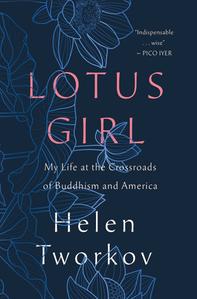
 It took Helen Tworkov until age 80 to write her memoir, but readers of Lotus Girl: My Life at the Crossroads of Buddhism and America will be happy that this quietly influential figure in the transmission of Buddhist thought and practice to the West has lived long enough to share her story in this revealing and intellectually stimulating book.
It took Helen Tworkov until age 80 to write her memoir, but readers of Lotus Girl: My Life at the Crossroads of Buddhism and America will be happy that this quietly influential figure in the transmission of Buddhist thought and practice to the West has lived long enough to share her story in this revealing and intellectually stimulating book.
Though her memoir is organized chronologically, Tworkov appropriately has chosen to describe what she calls "my collaged life" in nearly 70 brief, essayistic chapters. She's a graceful writer who possesses well-developed insight and a wealth of stories to share from her encounters with an array of fascinating spiritual teachers and others, including Willem de Kooning, a friend of her well-known artist father, Jack Tworkov, and the composer Philip Glass, who became a close friend.
Tworkov (Zen in America: Profiles of Five Teachers), the child of secular Jewish parents, traces her earliest curiosity about Buddhism to the day in 1963 when she saw a photograph of Vietnamese Buddhist monk Thich Quang Duc self-immolating in protest against the oppression of his fellow Buddhists in that country. After a six-month sojourn in Japan, she spent most of 1966 in Kathmandu, where an itinerant peddler gave her the nickname that provides the book's title.
Tworkov also describes how, in the United States, she helped cultivate practices like meditation that went from being expressions of the counterculture to mainstream acceptance. In her case, she swung from an initial engagement with Tibetan Buddhism to the practice of Zen under the tutelage of well-known teacher Bernie Glassman in New York City. As she entered her seventh decade, Tworkov returned to her Tibetan Buddhist roots, including collaborating with the prominent lama Yongey Mingyur Rinpoche on his book In Love with the World: A Monk's Journey Through the Bardos of Living and Dying, which describes the more than four-year wandering retreat that almost cost him his life.
Tworkov played an especially important role on the U.S. Buddhist scene beginning in 1991, when she founded the magazine Tricycle. She started the publication, which she managed until 2008, in response to a wave of scandals within Buddhism that involved sexual misconduct, and other forms of bad behavior on the part of highly respected teachers. In addition to educating its readers on Buddhism, it provided an outlet for objective reporting on the scandals and other news of the Buddhist world.
Helen Tworkov's name certainly is not as widely known as some of modern U.S. Buddhism's more visible progenitors. But when historians write its definitive story, she should receive her proper recognition, and this book will help ensure that happens. --Harvey Freedenberg, freelance reviewer
Shelf Talker: In her revealing and long-awaited memoir, a noted U.S. Buddhist describes her circuitous and enlightening life journey.

